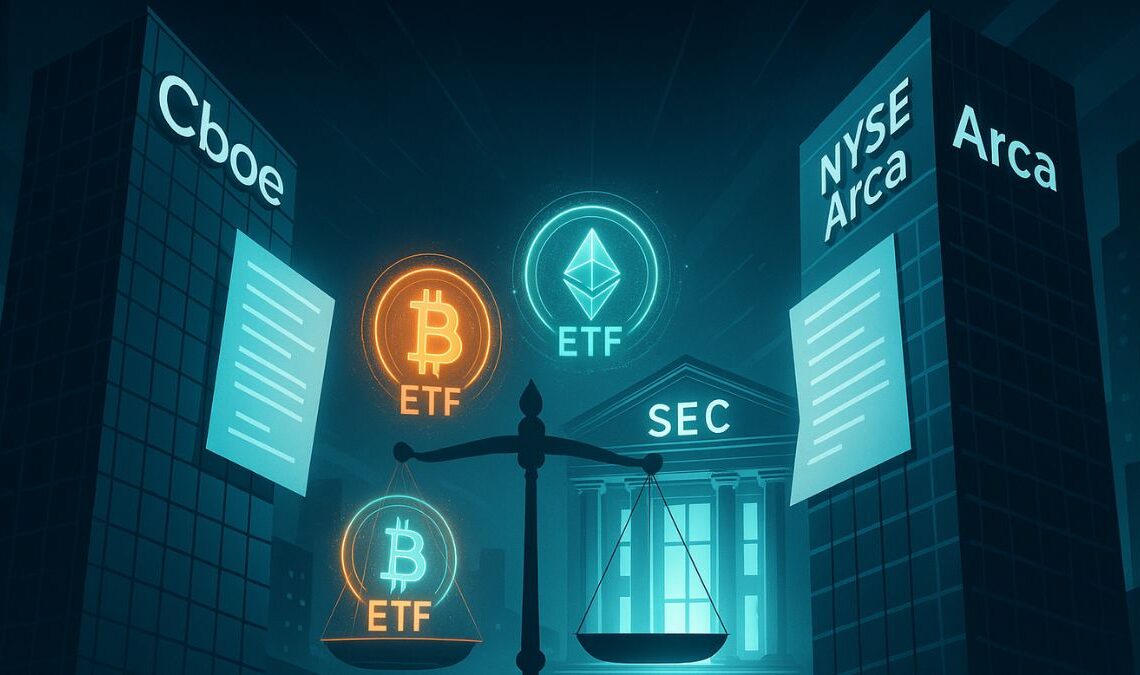The battle for clear Crypto ETF Rules is heating up. Cboe and NYSE Arca have just submitted a bold regulatory proposal to the U.S. Securities and Exchange Commission (SEC), setting the stage for major shifts in how crypto investment products are approved and managed in the U.S.
As the crypto market matures, so does the infrastructure supporting it. In a recent move that could significantly impact the future of digital asset investment, two of the largest U.S. exchanges—Cboe and NYSE Arca—are advocating for a reformed and unified regulatory framework that could fast-track crypto ETF approvals and increase competition in the space.
Cboe and NYSE Arca Challenge the Status Quo
According to a July 30 X post by ETF analyst Nate Geraci, both Cboe and NYSE Arca filed letters with the SEC demanding that crypto ETFs be regulated consistently across all U.S. exchanges. Their argument is rooted in a desire for regulatory parity, especially following the approval of multiple Bitcoin ETFs earlier this year.
Cboe just filed 19b-4 requesting a rule change which would allow crypto ETFs to list & trade under a standard framework…
— Nate Geraci (@NateGeraci) July 30, 2025
In other words, issuers wouldn’t have to request specific approval for each crypto ETF as long as it meets certain criteria. pic.twitter.com/BXC2fSZGxB
The exchanges are asking for a rule change that would allow spot crypto ETFs to be listed with the same ease as traditional commodity ETFs. This means they could soon be treated like gold ETFs—products that already enjoy streamlined review processes and broader institutional acceptance.
What’s at Stake with New Crypto ETF Rules?
The implications of this proposal are massive. If the SEC agrees to amend existing rules or adopt the changes suggested by Cboe and NYSE Arca, it could open the door for a wave of new spot crypto ETFs, including products focused on Ethereum, Solana, and even more niche assets.
More importantly, it could end years of regulatory gridlock and inconsistent rulings. As it stands, different exchanges have faced vastly different treatment from the SEC when attempting to list similar crypto-based funds. That lack of uniformity has slowed innovation and frustrated both institutional and retail investors.
In their letters, the exchanges argue that approving similar products across various venues would increase market transparency, deepen liquidity, and reduce risk. As reported, they also called out the SEC’s historical hesitancy around crypto, asserting that the current system “stifles competition and investor choice.”
Market Reaction and Industry Support
The reaction from the investment community has been swift. ETF experts like Eric Balchunas have highlighted how this proposal, if accepted, could bring a wave of spot crypto ETFs beyond Bitcoin into the mainstream. The momentum follows the SEC’s recent greenlight for in-kind redemptions on crypto ETPs, which many analysts believe was a key regulatory milestone in itself.
This broader industry pressure suggests that regulatory attitudes toward crypto ETFs may finally be shifting. As institutional adoption rises, the demand for well-regulated, exchange-listed crypto products becomes impossible to ignore.
SEC’s Next Move
The ball is now in the SEC’s court. While the Commission has not issued an official response, this latest proposal places it under intense scrutiny. The timing is particularly sensitive, as the presidential election cycle looms, and regulatory clarity on digital assets remains a hot-button issue.
The SEC’s decision could either validate the crypto market’s maturation or reinforce concerns about regulatory hostility in the U.S. With other jurisdictions like Hong Kong and the EU taking clear steps to integrate crypto into their financial systems, the U.S. risks falling behind without decisive action.
Final Thoughts: Why These Crypto ETF Rules Matter Now
As calls for updated Crypto ETF Rules grow louder, the submission from Cboe and NYSE Arca represents a pivotal moment in the U.S. regulatory landscape. It’s not just about enabling more ETFs—it’s about modernizing financial regulation to reflect the growing role of digital assets in global markets.Whether the SEC embraces this opportunity or remains cautious, one thing is clear: the pressure is building, and investors are watching closely. A new regulatory era for crypto ETFs may be just around the corner—and it could redefine how the world’s largest financial market treats blockchain innovation.










